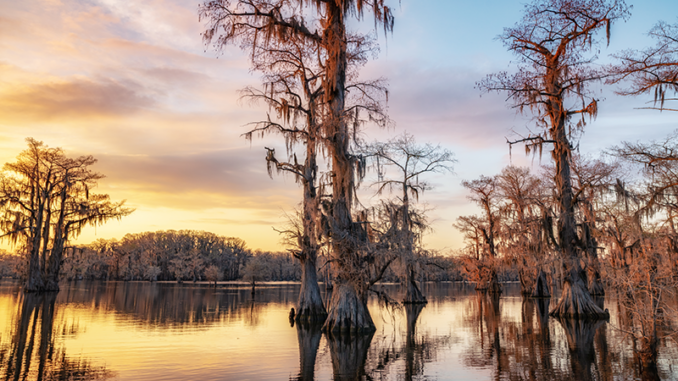
Happy New Year!
From Louisiana’s abundant fish and wildlife natural resources, and the men, women and children who enjoy such things, here’s a wish the next few years will be better than the last eight.
Without naming names — and didn’t your Mama tell you “if you can’t say something nice about someone, then don’t say anything” — Louisiana’s Department of Wildlife and Fisheries has been run as if it was a red-headed stepchild (with all apologies to anyone red-headed and anyone who’s a stepchild.)
The hope is these folks will go away, these folks who made life a growing misery when it came to fish (especially fish) and wildlife issues.
The heart-felt hope is that newly elected governor Jeff Landry has found the just-right people to run this vital state agency, and appoints the just-right people to the Wildlife and Fisheries Commission. (Check out LouisianaSportsman.com to see recent LDWF leadership appointments)
The commission is important, if only because somewhere during the last eight years, some commission members forgot, sometimes conveniently, the charge of “managing and protecting Louisiana’s abundant natural resources.” (Those last 10 words come from the Department of Wildlife and Fisheries themselves.)
Check your ego
Another few words should be added to the commission’s mantra, something along the lines of “Check your ego at the door” when you come in to decide what’s good for our state’s abundant natural resources. And the men and women who use them.
Saying that in a few words goes beyond the commission’s composition.
One among the seven on this board serves “at the pleasure of the governor,” which means a four-year term concurrent with the governor’s term. Six members serve six-year terms, unless one is caught with his hand in the cookie jar as what happened in the recent administration.
Before appointing anyone to the commission, we need to ask our governor to be selective in his or her appointments. By state mandate, this seven-member panel must have folks from the recreational and commercial user groups.
It’s understood these interests need to be represented, but, again, egos and self-interest must be put aside when voting to change or enact regulations to manage and protect Louisiana’s abundant natural resources.
What’s more, we should demand a governor’s chosen few on this commission act for the overall good for our state, and that insistence should apply to recreational fishing and hunting interests along with oysters, shrimp, finfish, fur, alligators, turtles, et cetera, et cetera.
Folks who pay
After all, we’re the folks who fork over hard-earned dollars for licenses and other fees that keep the Louisiana Department of Wildlife and Fisheries afloat.
The mention of fees brings us to another pet peeve: Our Wildlife and Fisheries operates on our fees and the federal funds derived from those fees. The agency operates without state General Fund dollars all the while contributing hundreds of millions in state taxes to our state’s coffers.
Maybe, just maybe, our elected officials sitting in that tallest building in Baton Rouge could, somehow, come up with a way to give a tax break to developing better marinas and launches across our state.
We give tax breaks for industrial developers of other major projects, so why not to a business targeting an industry responsible for not only the tax revenue, but also tens of thousands of jobs. Not to mention the joy of so many of our tax-paying, outdoor loving citizens.
Maybe that could extend to first-rate hunting preserves so our quail and pheasant hunters could enjoy top-drawer hunting without having to drive hundreds of miles away to enjoy this age-old sport.
Better funding
Maybe, just maybe, our legislature could come up with a way to fund better fishery and hunting studies without taxing much needed Wildlife and Fisheries money. Where would our offshore fishermen (and the other four Gulf States) be if Congress had not voted in millions for the Great Red Snapper Count.
The infusion of federal dollars established a mechanism to prove what many biologists, those not swallowing the flawed National Marine Fisheries Service data, believed. That program sent federal fisheries folks into hiding because the Count produced red snapper numbers three times more than federal numbers.
At the risk of being repetitive, outdoor writers in almost every corner of our state battled for years to get our Wildlife and Fisheries agency to consider recreational work just as important as all the effort this department spent on commercial interests.
Years ago, it took our State Legislature to ban monofilament, then multifilament, gill nets and to grant gamefish status to redfish to give better balance to both recreational fisheries and hunting concerns.
That increased attention has led us to the current reduction in speckled trout limits. You might think that to be good, or bad, but this attention to this important species is needed.
Same Is true for redfish: Here’s hoping you will read Joe Curtis’ report on the commission’s latest venture into reducing the take of redfish, and the continuing battle — or kick-the-can down the road game — between the commission and State Legislature oversight.
So, Happy New Year, and let’s hope and pray our new governor has or will make the appointments needed to get the Louisiana Department of Wildlife and Fisheries back on the right track. There’s so much riding on it.


